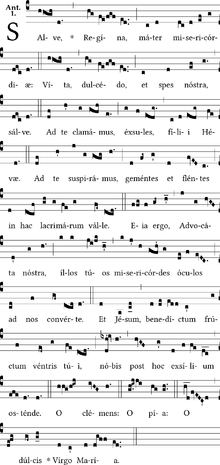
Back Salve Regina Catalan Salve Regina Corsican Salve Regina Czech Salve Regina German Salve Regina Esperanto Salve Spanish Salve Regina Estonian Salbe Basque Salve Regina Finnish Salve Regina French


The "Salve Regina" (/ˌsælveɪ rəˈdʒiːnə/ SAL-vay rə-JEE-nə, Ecclesiastical Latin: [ˈsalve reˈdʒina]; meaning "Hail Queen"), also known as the "Hail Holy Queen", is a Marian hymn and one of four Marian antiphons sung at different seasons within the Christian liturgical calendar of the Catholic Church. The Salve Regina is traditionally sung at Compline in the time from the Saturday before Trinity Sunday until the Friday before the first Sunday of Advent. The Hail Holy Queen is also the final prayer of the Rosary.
The work was composed during the Middle Ages and originally appeared in Latin, the prevalent language of Western Christianity until modern times. Though traditionally ascribed to the eleventh-century German monk Hermann of Reichenau, it is regarded as anonymous by most musicologists.[1] Traditionally it has been sung in Latin, though many translations exist. These are often used as spoken prayers.
- ^ Lawrence Gushee, "Hermannus Contractus [Hermann der Lahme, Hermann von Reichenau]," in The New Grove Dictionary of Music and Musicians, 2nd edition (2001): "Although the most venerable ascriptions to Hermannus – the Marian antiphons Alma Redemptoris mater and Salve regina – have been taken away by most recent scholarship, the true authorship is still, and possibly will be for ever, the subject of controversy."